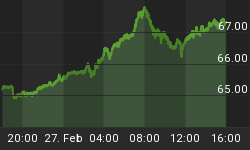Mike Mayo, CLSA's bank analyst, told Bloomberg TV's Stephanie Ruhle and Erik Schatzker on "Market Makers" today that "We are about to see a rebirth of shareholder rights...I will be going to the annual meetings for the first time ever."
Mayo also said, "Come back as a corporate director, you get fired one out of three thousand times, you get paid a lot of money. A lot of times it is very incestuous. It is a country club sort of attitude. Everybody is looking after each other. That is not what we need, especially among banks, which have been some of the worst long-term performers."
Mayo on the banking industry:
"We're about to see a rebirth of shareholder rights. That rebirth of shareholder rights is the owners, the large institutional investors taking control of their ownership stake. Consider this statistic. one out of every 3000 corporate directors in the United States gets fired so the average person on the street is 200 times more likely to be unemployed than a corporate director. i don't think all those corporate directors are that good. This isn't being lost on the big owners. I think this season you are going to have more no votes for corporate directors I think we need some of that in the banking industry. I think Keycorp should change some of their directors around. And the feedback that I've gotten from investors is, yeah, they could use some changes. It's not just Keycorp, it is not just the banks, It is overall corporate America.
Look at the world's largest asset manager, BlackRock. Almost $4 trillion of money that they manage. They have a 20 person dedicated to group that looks at corporate governance. They vote against management proposals about one third of the time in different meetings around the United States. They are stepping up to the plate. If the thousand pound gorilla sets up to the play, you will see others doing it too.
On whether he believes shareholders will refused to be sweet talked by bank management, CEOs or directors themselves:
"What I'm focused on are those big banks where the parts are worth more than the whole. And the shareholders are speaking up more. I am speaking up more. I am going to the annual meeting. We start off on April 24--Citigroup at the New York Hilton. I'll be there. I will be asking the directors, how will you realize value when you consider breaking up the company? It has been 15 years since Citigroup has been formed. We are all focused on earnings season and that is good for three months, but instead of focusing on earnings season, we should be focused on the annual meetings season when the directors who oversee the companies can be held more accountable."
On why these directors don't challenge their banks more:
"It is a sweetheart deal. I mean, come on, it's a nice gig. Hopefully you can take off a couple of months, Stephanie, but come back as a corporate director, you get fired one out of three thousand times, you get paid a lot of money. A lot of times it is very incestuous. It is a country club sort of attitude. Everybody is looking after each other. That is not what we need, especially among banks, which have been some of the worst long-term performers."
On what banks need to do:
"It starts with the owners, the shareholders and people who represent the shareholders. Other sell-side analysts like myself. So I will be going to the annual meetings for the first time ever. Other institutional investors have said, Mike, way to go, we like you doing that. Other investors say that we are more apt to vote against these companies and the investors are more likely to talk to them behind the scenes. what the activist investors have started--you've seen a few, Nelson Peltz' firm, Trillium Asset Management try in Citigroup, Dan Loeb at Third Point--start the ball rolling a little bit more. Now the big investors take the ball."
On CEO compensation:
"I do not think we will see as much of a milestone event as we saw at Citigroup with say-on-pay, but I do think that was a warning shot to say hey, we spoke up about say on pay, and it had an influence and eventually Vikram Pandit got fired. Now we're speaking up about the directors at Keycorp, we're talking about the costs at Morgan Stanley, we're talking about the capital return at State Street, we're talking about the business mix at Citigroup. So once you have success in one area, you get people's attention and we might have success in other areas."
On why banks haven't woken up to the need for more qualified directors:
"Why doesn't bank management say, hey, let me have someone tougher who is going to evaluate me? I would love a soft boss. I want some of these corporate directors as my boss. They're tough on me where I work. They want me to work hard and pay me for my performance."
"People do what they're incented to do and we've run all sorts of correlations in the banking industry. The larger the bank a CEO runs, the more money they make, regardless of performance and one reason is because the directors are not doing a well enough job."















